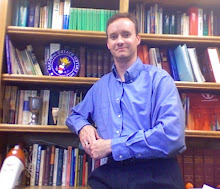Fantastic news to share. The makers of Accordance Bible Software now have a blog!
News, How-tos, and assorted Views on Accordance Bible Software.
Catchy, no?
David Lang in the inaugural post alludes to being late-comers to the blogging machine. They just last year moved their user forums from a list-serv to
web bulletin board forum software. It really is difficult to discern which modes (email, forums, blogs, traditional web pages) fit such situations. I think it's the right move to have both the user forum and the blog, and that everything that makes its way into the "Official Announcements" category of the forums also find their way onto the blog. I would suggest a little more design work done on the blog so that it fits more seamlessly into the color scheme of the web pages in general. However, also keeping a "News" section on the web page adds to techno-option-overflow; it is now superfluous. Archive the remaining news announcements on the old news page and then redo the web page to point not to a "News" section but to the blog. (And don't be hard about not blogging before; frankly, the News section of the web page is exactly what a blog is, just more strict on content and without using convenient blog software that encourages frequent posting.)
David today had this to say about his answer to the oft-asked question of why develop only for the Mac:
The answer is simple: We aren't out to take over the world, we just want to create Bible software which is "insanely great." And where except on the Mac can you create insanely great software?
For the less cheeky response, you could have a look at their
web support page, as well.
If you use Accordance, I can't imagine why you wouldn't add the page to your daily RSS/Atom feed (except for the fact that they don't yet have the link available from their web page). If you want it, here it is:
http://www.accordancebible.com/blog/atom.xml

 Victor Gaultney created the font on his Mac using
Victor Gaultney created the font on his Mac using 
